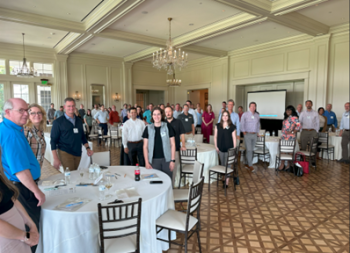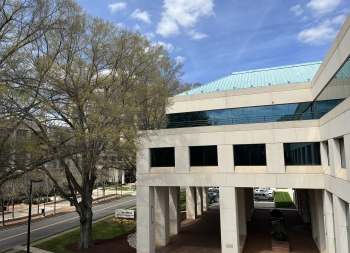General Legislature Passes Significant Changes to Uninsured and Underinsured Motorist Law
By Allen C. Smith, Brooks P. Miller, Julianna Grant, and Austin R. Walsh
On September 22, 2023, Senate Bill 452, An Act to Make Various Changes to the Insurance Laws of North Carolina, to Amend the Insurance Rate-Making Laws, and To Revise High School Interscholastic Athletics, was presented to Governor Roy Cooper for signature. Because Governor Cooper took no action, SB 452 was codified as Session Law 2023-133 (S.L. 2023-133) on October 3, 2023. In addition to prohibiting male students from participating in female athletics, S.L. 2023-133 includes sweeping changes to liability, uninsured motorist (UM), and underinsured motorist (UIM) coverage in auto liability policies through amendments to N.C. Gen. Stat. § 20-279.21. The changes to UM and UIM coverage go into effect on January 1, 2025.
Specifically, the minimum automobile liability policy limits will increase from $30,000 to $50,000. Additionally, S.L. 2023-133 amends N.C. Gen. Stat. § 20-279.21 regarding the rules for service of process on UM insurers outside of the statute of limitations, the definition of an underinsured vehicle, and the calculation of a UIM insurer’s liability.
Uninsured Motorist Coverage
Before S.L. 2023-133, plaintiffs were required to serve a summons and complaint on uninsured motorist (UM) carriers within the statute of limitations. Nearly 50 years ago, the North Carolina Supreme Court established that this requirement was “consistent with the objective of uninsured motorist coverage of placing the insured in the same position as he would have been had the adverse motorist been insured.” Brown v. Lumbermens Mut. Cas. Co., 258 N.C. 313, 319, 204 S.E.2d 829, 833 (1974) (internal citations omitted). The service requirement was plainly stated by the Court of Appeals in Thomas v. Washington: “Failure of insured to serve [a] copy of the [the] summons and complaint on insurer within [the] applicable limitations period [precludes] … recovery under [a] UM policy.” 136 N.C. App. 750, 525 S.E.2d 839 (2000). If a plaintiff failed to serve the Summons and Complaint on a UM carrier within the statute of limitations, the UM claim was subject to dismissal. See Davis v. Urquiza, 233 N.C. App. 462, 757 S.E.2d 327 (2014). The statute of limitations could not be satisfied by mere notice; formal service of process was required to withstand a motion to dismiss. See id.
Session Law 2023-133
The new language in S.L. 2023-133 states:
The insurer may also be issued a summons, complaint, or other process as an unnamed party and served by registered or certified mail, return receipt requested, or any manner provided by law. Service outside the statute of limitations shall be valid so long as the summons has been properly issued, preserved, and served pursuant to North Carolina Rule of Civil Procedure 4.
S.L. 2023-133(b)(3)(A) (emphasis added). This legislative change overturns 50 years of precedent. Now, a plaintiff may fail to serve the UM carrier within the statute of limitations for the tort action at issue as long as the summons and complaint are filed within the statute of limitations and the summons does not expire prior to service. This will place UM carriers in the same position as tort defendants with regard to statutes of limitations and removes a significant procedural defense.
Underinsured Motorist Coverage
S.L. 2023-133, Section 12(b)(4) amends the method for calculating a UIM carrier’s exposure. Currently, NC Gen. Stat. Section 20-279.21 reduces UIM coverage limits by a tort-feasor’s liability policy limits. For example, if a tort-feasor has policy limits of $50,000 per person / $100,000 per accident and a plaintiff has UIM limits of $50,000, the UIM carrier would have no exposure. UIM carriers will no longer reduce the amount of available coverage by the liability policy. Under the amendment, UIM carriers are now fully exposed up to their policy limits. In the above example, a plaintiff will receive the benefit $100,000 of insurance coverage having only paid for $50,000 of coverage. These changes will also result in increased defense costs for carriers, who will remain exposed in matters where they were previously dismissed as a matter of course.
Section 12(b)(4) also changes the definition of an underinsured vehicle. Presently, an underinsured vehicle is defined as “a highway vehicle with respect to the ownership, maintenance, or use of which, the sum of the limits of liability under all bodily injury liability bonds and insurance policies applicable at the time of the accident is less than the applicable limits of underinsured motorist coverage for the vehicle involved in the accident and insured under the owner’s policy.” N.C. Gen. Stat. § 20-279.21(b)(4). When two or more injured persons pursue claims, “a highway vehicle will also be an ‘underinsured highway vehicle’ if the total amount actually paid to that person under all bodily injury liability bonds and insurance policies applicable at the time of the accident is less than the applicable limits of underinsured motorist coverage for the vehicle involved in the accident and insured under the owner’s policy.” Id.
As of January 1, 2025, section (b)(4) will provide that an underinsured vehicle is any vehicle for which policy limits are less than “the total damages sustained by an individual seeking payment of benefits[.]” See S.L. 2023-133(b)(4). Before a claim is reduced to a judgment, personal injury damages are variable and subject to hard-to-value general damages (e.g., pain and suffering). Because UIM carriers will have less certainty whether a tortfeasor’s vehicle is underinsured, carriers are likely to incur increased defense costs closely monitoring a claim.
The ramifications of S.L. 2023-133 will hit insurance carriers and insureds alike. Each change to N.C. Gen. Stat. § 20-279.21 increases UM and UIM insurers’ risk and exposure. It is likely this increased risk will be passed on to the citizens of North Carolina in the form of higher insurance premiums. The legislature’s intention, whether at the behest of plaintiffs’ attorneys or not, was to increase the recovery for injured parties. The ultimate cost remains to be seen.
Smith, A. C., Miller, B. P., Grant, J., Walsh, A. R., & NCADA. (2024, February 8). Legislature Passes Significant Changes to Uninsured and Underinsured Motorist Law. The Resource. North Carolina Association of Defense Attorneys



